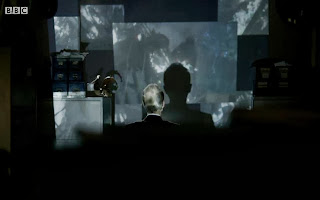Okay, I'm sorry, but you see, I've become Anderson.
And this is how I watch Sherlock now.
Because of all my hard time watching and rewatching earlier episodes, I feel like I have a pretty excellent understanding of the Sherlockian universe. So, with all that said, there a few things still bothering me about yesterday's stunning return.
1. The distinct tonal shift from the previous two seasons. Sherlock has always been a little campy (maniacally so with Andrew Scott's depiction of Moriarty) but it read heavily as drama first. Comic relief certainly occurs, but I'm pretty sure I debated crying for John during The Reichenbach Fall. With Sherlock's gleeful return comes a new surge of manic comedy. While some of it holds true to canon (Mrs. Hudson's histrionics with the frying pan, for example), others do not (Sherlock's nod to Inspector Clouseau). Look, I get that Sherlock meets John again when he is in disguise and that dressing up is something he does frequently. But the scene where he dresses up like a waiter and buffoonishly tromps around the restaurant is off-putting to say the least. And a far departure from the ancient bookseller he appears as in "The Empty House." It felt more like Italian farce and it was distinctly more playful than I recall pre-fall Sherlock being.
2. Mary, Mary, Quite Contrary. Or, perhaps, distinctly not contrary at all. That, too, works with the canon - Mary was no shrew; she never tried to stop John from playing with Sherlock and recognized their work as important. But there is something up with Mary, yes? Let's look at another screencap of Sherlock's reading of her:
Here are the words of distinct interest to me: clever, shortsighted, guardian, linguist, secret, and liar. Don't get me wrong; I love that she's a size 12 (American size 8) and bakes her own bread, but those aren't really of importance to anything besides her waistline and the projected depiction of her as nurturing and maternal.
A friend of mine argues that Guardian refers to the newspaper, not the role. I think it could be more than that. We already know her politics lean left, so whether or not she reads the Guardian is of little import (and, yes, I know that newspaper reading is a different thing altogether in England than it is here). That leaves two other possibilities: her personality type (myer-briggs) is Guardian or that she operates in some capacity as a guardian herself (as a nurse, that would not be too great of a stretch. also, in intervening on Sherlock's behalf for John's betterment, she, too, seeks to protect and help her fiance). So, that's something to ponder. We also know she is a liar and I've given my thoughts about that as well. The fact that she's clever and a linguist are also particularly of note to me. If she's a nurse, Mary's linguistic skills might pay off with foreign patients. But a secret, clever, lying linguist with a part-time job? That sounds a little bit like my sister might be right and Mary might have been hired by Mycroft to keep tabs on John while Sherlock's away.
Of course, there's another possibility: that Mary will somehow be connected to the big bad. We know precious little about Mary (I suspect we will have a far better picture after Sunday's Sign of Three when we meet whatever she has by way of friends or extended family). I keep thinking about John's abduction. It doesn't make sense. It bothers me. Why does the mystery man in the shadows want John? And, if it's to get to Sherlock specifically, why send the warning to Mary? Let's ponder our Big Bad a little more, shall we?
3. Magnusson. I saw his name go by the bottom of the screen during the Anderson/Goth girl scene (I knew it was too funny and that they had to be trying to sneak something by me!) and googled him. Turns out, he's Milverton, the worst man in England, the blackmailer. And he operates out of the creepiest Island of Misfit Toys I've ever seen.
If he is a blackmailer, what exactly is he watching for so intently in the final clip from "The Empty Hearse"? Who is he attempting to extort with that video? Surely not John, he's got to be the pawn. But who is the message for? There's got to be something I'm missing here, but what? Is he connected to Mary (blue-eyed, poor eyesight)? Does this mean we need to consider the Holmes brothers more carefully?
4. I keep thinking back to the tonal shift. In particular, the humanizing moments we see between Sherlock and Mycroft. Like the Goth girl scene, the Operation Game made me feel all warm and fuzzy and loved. Which immediately makes me suspicious. Are they giving us this information/insight now to use it against later? To manipulate us? Mycroft would be an excellent target for a new criminal mastermind, particularly a blackmailer. What am I missing in all this soft talk about Mycroft's isolation and lonely heart?
So, those are my new thoughts. More thoughts. Too many thoughts. Loved all the Guy Fawkes bits. Want to make an effigy that looks like this one for next year:
Thanks to my sister for all the obsessive screencaps.
More to follow.




No comments:
Post a Comment